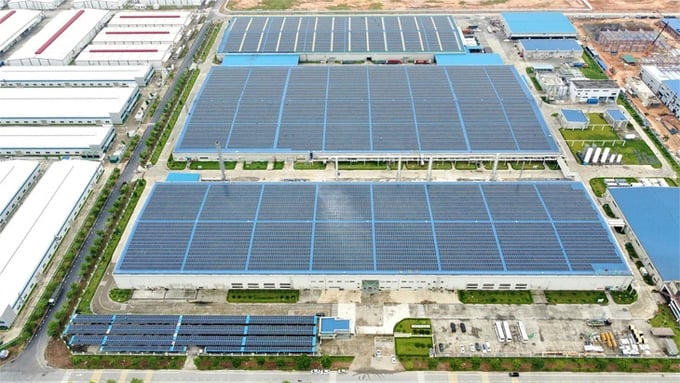June 19, 2025 | 03:17 GMT +7
June 19, 2025 | 03:17 GMT +7
Hotline: 0913.378.918
June 19, 2025 | 03:17 GMT +7
Hotline: 0913.378.918

Businesses have committed to building carbon-neutral factories and reducing emissions. In the photo: a factory using 100% solar power in Vietnam. Photo: T.S.
In mid-May, Pandora Group will start constructing a factory worth more than USD 150 million in Binh Duong. To decide to locate in Vietnam, the world's largest jewelry group carefully selected 27 other countries to consider the advantages of each country.
What's special is that when deciding to build a factory in Vietnam, Pandora Group will build a factory that meets LEED Gold standards (a prestigious green building certification issued by the US Green Building Council) and will use 100 % recycled energy. This will also be the group's third factory, which uses 100% electricity from renewable energy sources, compared to the previous two factories, both of which used solar power.
Right next door, the Lego Group will also build a 50MW solar power farm, which is expected to be deployed next to the toy factory, and install an additional 4MW of rooftop solar power so that the above power sources serve production activities by Lego.
Meanwhile, Trina Solar Company has built and operated a factory in Thai Nguyen that uses 100% solar power. This factory has an area of more than 160,000m2. The entire roof system is installed with solar power with a total capacity of 12.6MW.
Mrs. Elva Wang - Head of South East Asia, Trina Solar Asia Pacific - said that factories increasing the use of solar power and installing electricity storage systems will help factories be proactive in energy and reduce carbon emissions towards sustainable development.
As an enterprise with many factories in Vietnam, Nestlé Group said that it is committed to reducing emissions by 20% by 2025 and 50% by 2030 so that by 2050 net emissions will be zero. By 2023, this business has reduced emissions by 13.58% thanks to efforts to change production processes.
Mr. Pham Van Viet - vice president of the Ho Chi Minh City Textile, Garment and Embroidery Association - said that reducing emissions in units exporting to demanding markets such as the EU and Japan is gradually becoming urgent. Therefore, many businesses have had to use machines that consume less electricity, convert boiler technology, and install solar power on factory roofs to meet green criteria and reduce emissions.
Translated by Huong Giang

(VAN) To address plastic pollution, closing the plastic recycling cycle will bring significant economic and environmental benefits.

(VAN) According to the Binh Thuan Department of Industry and Trade, in the first five months of 2025, Binh Thuan's dragon fruit export turnover increased by 20.65% compared to the same period last year.

(VAN) EU countries on Thursday gave final approval to new tariffs on fertilizer imports from Russia, a move aimed at cutting off revenue that could support Moscow’s war in Ukraine, despite concerns from European farmers.

(VAN) The working delegation from the Ministry of Agriculture and Environment conducted an important trip to the Netherlands to strengthen strategic partnerships and sustainable development in the agricultural sector.

(VAN) The letter ‘A Plea from the Ocean’ not only evokes emotion but also awakens the human conscience to the responsibility of protecting life on Earth.

(VAN) The Department of Agriculture in South Africa has announced the country’s first mass vaccination of poultry to prevent local birds from contracting avian influenza.

(VAN) Establishment of the Mekong Delta Regional Agricultural Linkage Center, aiming for a closed value chain, deep processing, trading platforms, and international market connectivity.